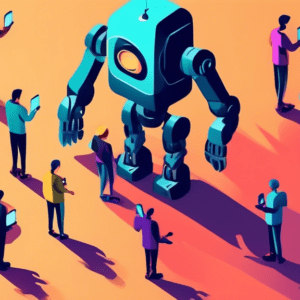The Rise of AI: A New Era of Technological Advancement
Artificial intelligence (AI) is no longer a futuristic concept confined to science fiction. It is rapidly transforming our world, revolutionizing industries, and redefining the boundaries of human capability. From self-driving cars to virtual assistants, AI is permeating every aspect of our lives, and at the forefront of this technological revolution are the Big Tech giants.
Big Tech’s Dominance: A Force to Be Reckoned With
Companies like Google, Amazon, Microsoft, Meta (formerly Facebook), and Apple have emerged as dominant players in the AI landscape. Their vast resources, access to massive datasets, and cutting-edge research capabilities have given them a significant advantage in developing and deploying AI technologies. Let’s delve deeper into how each of these tech titans is shaping the AI industry:
1. Google: Leading the Charge in AI Research and Development
Google has long been recognized as a pioneer in AI. Its search engine, at its core, is an AI-powered system that leverages machine learning algorithms to deliver highly relevant search results. Google’s AI subsidiary, DeepMind, has made groundbreaking advancements in AI, including the development of AlphaGo, the first AI program to defeat a professional Go player.
Google’s AI expertise extends beyond search. Its cloud computing platform, Google Cloud, offers a wide range of AI and machine learning services, empowering businesses of all sizes to harness the power of AI. From image recognition to natural language processing, Google’s AI tools are transforming industries such as healthcare, finance, and transportation.
2. Amazon: Powering AI-Driven Experiences in E-commerce and Beyond
Amazon’s dominance in e-commerce is deeply intertwined with its AI capabilities. Its recommendation engine, which suggests products to customers based on their browsing history and past purchases, is a prime example of AI in action. This personalized shopping experience has been instrumental in Amazon’s success.
Beyond e-commerce, Amazon is leveraging AI to revolutionize other industries. Its voice assistant, Alexa, is powered by natural language processing and machine learning, allowing users to interact with technology in a conversational way. Amazon Web Services (AWS), the company’s cloud computing arm, provides a comprehensive suite of AI services, enabling developers to build and deploy AI-powered applications.
3. Microsoft: Empowering Businesses with AI Solutions
Microsoft has been steadily investing in AI research and development, focusing on areas such as computer vision, natural language processing, and machine learning. Its cloud platform, Azure, offers a wide range of AI services, empowering businesses to build intelligent applications.
One of Microsoft’s key strengths in AI is its enterprise software offerings. Its productivity suite, Office 365, incorporates AI features such as smart assistants and automated tasks, enhancing productivity and efficiency. Microsoft is also a major player in the field of AI-powered healthcare solutions.
4. Meta: Connecting the World Through AI-Powered Social Media
Meta, formerly Facebook, leverages AI to power its vast social media platforms. From content moderation to targeted advertising, AI is deeply integrated into Facebook’s operations. Its facial recognition technology, while controversial, is among the most advanced in the world.
Meta is also investing heavily in AI research, particularly in the areas of computer vision, natural language processing, and machine learning. Its AI research lab, FAIR (Facebook AI Research), has made significant contributions to the field, publishing cutting-edge research papers and open-sourcing AI tools and datasets.
5. Apple: Enhancing User Experiences with AI at the Edge
Apple’s approach to AI differs slightly from its Big Tech counterparts. While Google, Amazon, and Microsoft focus heavily on cloud-based AI services, Apple prioritizes on-device AI, integrating AI capabilities directly into its devices.
Apple’s AI expertise is evident in features such as Face ID, Siri, and the Apple Neural Engine, a dedicated processor designed for machine learning tasks. By processing AI workloads locally on devices, Apple aims to enhance user privacy and improve performance.
The Implications of Big Tech’s AI Dominance
The dominance of Big Tech in the AI industry has significant implications for society as a whole. On the one hand, their investments in AI research and development are driving innovation and accelerating technological advancements. Their AI-powered products and services have the potential to improve our lives in countless ways.
However, there are also concerns about the potential downsides of Big Tech’s AI dominance. Some experts argue that their control over vast datasets and AI technologies could stifle competition and limit innovation outside of these tech giants. There are also concerns about algorithmic bias, privacy violations, and the potential for job displacement as AI automates tasks previously performed by humans.
The Future of AI: Collaboration and Ethical Considerations
As AI continues to evolve, it is crucial to foster collaboration between Big Tech companies, startups, academic institutions, and policymakers. Open-source AI initiatives, data sharing agreements, and ethical guidelines can help mitigate the potential risks associated with AI while promoting innovation and ensuring that the benefits of AI are shared widely.
The future of AI is bright, but it is essential to proceed with caution and address the ethical considerations surrounding its development and deployment. By working together, we can harness the transformative power of AI for the betterment of humanity.
